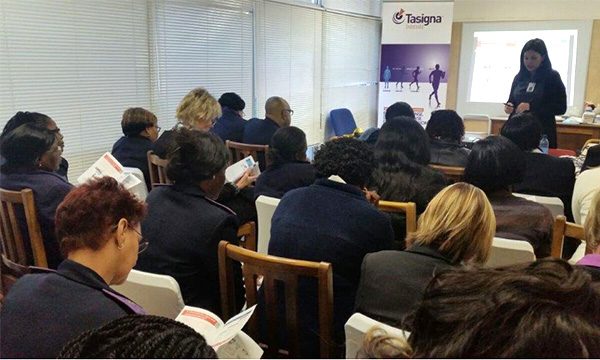 In an ideal world, a diagnosed cancer patient would receive disease and treatment information from their physician and healthcare workers at the clinic. With access to technology, they would broaden their knowledge and gain additional support from a patient group. Family and community members would also play a supportive role in searching for information and support.
In an ideal world, a diagnosed cancer patient would receive disease and treatment information from their physician and healthcare workers at the clinic. With access to technology, they would broaden their knowledge and gain additional support from a patient group. Family and community members would also play a supportive role in searching for information and support.
The reality in Southern Africa is not ideal and can be very harsh for patients.
Working in South Africa comes with many challenges. Many of these challenges are shared with other African countries and likely shared by many around the world:
- Patients live far away from clinics and have limited access to specialized physicians.
- Patients do not have residential addresses or postal addresses – Block 5 Tree 16 is not reliable information.
- Patients speak various languages (11 official languages in South Africa to be specific) and many are illiterate.
- Patients do not have access to phones, cell phones or the internet.
We spend a lot of time sharing information with physicians and educating patients on ground level but we often forget about those who spend most of their time with patient – drawing blood, filling out forms, and administering treatment – our wonderful, supportive assistive healthcare workers a.k.a. nurses!
I shared my vision with Danielle that we should start a program in which we provide supportive healthcare workers with basic information on chronic myeloid leukemia (CML) which they can relay to patients. They are not to take over the role of the physician but simply emphasize key messages, especially in areas where we do not have patient groups or reach. Last month, Max presented the first Workshop for Assistive Health Care Workers!
The two-hour session was attended by 25 nurses from the oncology centre in Windhoek. The workshop explained the journey of a CML patient and how in the current situation the patients have limited access to information.
I asked the nurses, “As you are the ones spending the most time with CML patients, do you talk with them about the disease – give them info or answer questions?” The answer shocked me:
“We are afraid to speak with the CML patients because we don’t know what to say to them and do not have answers to their questions. We do not know anything about their disease.”
By using the booklet, which uses basic language and illustrations, I explained the what, how, why, and what now about CML. This is the exact information that we would share in a patient education workshop in the same language used by patients.
The result and feedback following the session was very supportive! Several nurses expressed gratitude in the training and felt empowered to assist CML patients. The head of nursing at the clinic requested a follow-up session as there was an additional 40 nurses who wishes to attend the session and those in attendance also wanted more information!
We will be presenting this workshop in other Southern African countries over the next few months, Zimbabwe, Botswana and Mauritius and then start with the follow-up workshops. We also asked the nurses to assist in identifying patient leaders and in the establishment of a patient group within their region.
I am really excited and grateful that we found this “link” between patients and information. It is a fantastic opportunity to educate and empower people who are in positions to educate and empower patients, where we do not have other mediums to do so. Stay tuned to learn how this project develops – this is just the beginning!

